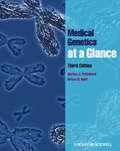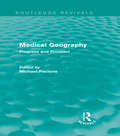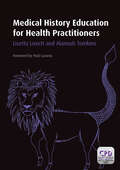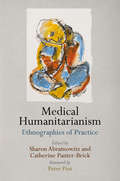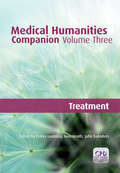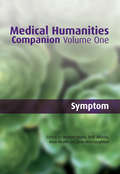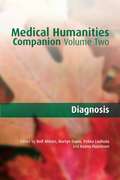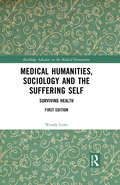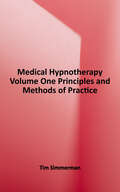- Table View
- List View
Medical Genetics and Law: An International Perspective
by Mair CrouchThis book is an essential resource to understanding the intersection of medical genetics and law. In a unique approach, it provides an overview on the biological principles of DNA basics and genetic inheritance linking the knowledge with the ethical and legal challenges presented by modern developments in genetics. The first chapters educate the reader in key concepts such as cell division, genetic inheritance, genome study methods, genetic screening and testing across various countries. It further expands into complex issues where regulation is required, in particular: controversial aspects of genetic modifications, ethical concerns around patient confidentiality and biobanks' role in linking genetic variation to complex diseases. It includes legal cases regarding negligence claims from conception to adulthood and reflects on the impact of present and future developments in genomics on the law. Readers will gain a deeper understanding of how developments in genetics impact individuals and society, helping them navigate this rapidly evolving field. Given the interdisciplinary approach, the book is suitable for both medical and law students, practicing lawyers, medical practitioners, and genetic counselors. It is particularly beneficial for those who deal with medical negligence and need to understand the genetic aspects of such cases.
Medical Genetics at a Glance
by Bruce R. Korf Dorian J. PritchardMedical Genetics at a Glance covers the core scientific principles necessary for an understanding of medical genetics and its clinical applications, while also considering the social implications of genetic disorders.This third edition has been fully updated to include the latest developments in the field, covering the most common genetic anomalies, their diagnosis and management, in clear, concise and revision-friendly sections to complement any health science course.Medical Genetics at a Glance now has a completely revised structure, to make its content even more accessible. Other features include: * Three new chapters on Gene Identification, The Biology of Cancer, and Genomic Approaches to Cancer* A much extended treatment of Biochemical Genetics* A completely revised chapter on The Cell Cycle, explaining principles of biochemistry and genetics which are fundamental to understanding cancer causation* Two new chapters on Cardiac Developmental Pathology* An extended Case Studies sectionProviding a broad understanding of one of the most rapidly progressing topics in medicine, Medical Genetics at a Glance is perfect for students of medicine, molecular biology, genetics and genetic counselling, and is a previous winner of a BMA Award.
Medical Genetics for the MRCOG and Beyond
by Edward S. Tobias J. Michael ConnorThis second edition has been comprehensively updated to reflect current clinical practice and the latest technical developments, including pre-implantation genetic diagnosis, array CGH, QF-PCR, non-invasive prenatal diagnosis and next generation sequencing amongst others. The first section covers basic principles, while the second outlines the more common situations where obstetrics and gynaecology interact with medical genetics. The third section contains real-life clinical case scenarios which have been selected to represent typical problems and to highlight areas which, if mismanaged, could have serious medico-legal consequences. Together with its accompanying website (www. essentialmedgen. com), it provides an invaluable guide to the use and selection of useful online genetic resources. This book is essential reading for candidates preparing for the MRCOG postgraduate examination, and any health professionals requiring a clear understanding of medical genetics and its increasingly frequent uses in obstetrics and gynaecology, where incorrect genetic advice can have serious consequences.
Medical Geochemistry
by Paolo Censi Thomas Darrah Yigal ErelThis book includes a collection of chapters illustrating the application of geochemical methods to investigate the interactions between geological materials and fluids with humans. Examples include the incorporation and human health effects of inhaling lithogenic materials, the reactivity of biological fluids with geological materials, and the impact on nascent biomineral formation. Biomineralization is investigated in terms of mineralogy, morphology, bone chemistry, and pathological significance with a focus on the health impacts of "foreign" geological/environmental trace element incorporation. One of the contribution is devoted to particulate matter, the presence of metals and metalloids in the environment, and the possibility of using human hair as a biomarker between environmental/geological exposure and human bioincorporation. Other chapters focus on the last advances on the analytical methods and instrumentational approaches to investigating the chemistry of biological fluids and tissues.
Medical Geography: Progress and Prospect (Routledge Revivals)
by Michael PacioneGeographers have for a long time contributed much valuable detailed data on the geographical patterns of disease and health care delivery to the medical world. On its first publication in 1985, this edited collection addressed the need for a review of progress in the field of medical geography that could also shape further developments. Topics under discussion include national systems of health care, the utilisation of health services, medical planning and medical geography in the developing world. This is a comprehensive volume that is it still of great relevance to today’s students of medical geography, health care and demography.
Medical Geology
by Jose A. Centeno Olle Selinus Robert B. FinkelmanMedical Geology is a rapidly growing field concerned with the relationship between natural geological factors and human and animal health, as well as with improving our understanding of the influence of environmental factors on the geographical distribution of health problems. This book brings together the work of geoscientists and medical/public health researchers, which addresses health problems caused, or exacerbated by geological materials (rocks, minerals, atmospheric dust and water) and processes (including volcanic eruptions and earthquakes. Among the environmental health problems discussed in this book are: exposure to toxic levels of trace essential and non-essential elements such as arsenic and mercury; trace element deficiencies; exposure to natural dusts and to radioactivity; naturally occurring organic compounds in drinking water; volcanic emissions, etc. The text also deals with the many health benefits of geologic materials and processes. This wide-ranging volume covers issues in medical geology all over the world with each author covering their respective region. It provides examples from different continents as well as a state-of-the-art review of the latest developments in the discipline. The authors are all recognized geoscientific and medical experts working in the field. The book is written for a wide variety of specialists from geologists, geochemists, pathologists and medical doctors to veterinarians and biologists.
Medical Geology for Beginners (SpringerBriefs in Medical Earth Sciences)
by Kirtikumar Randive Pratik GodboleThis book is created for a diverse audience that includes geologists and Earth scientists studying the impacts of geological processes on human health, as well as health professionals and medical researchers interested in the environmental determinants of health. It is also a good reference for the environmental scientists and public health policymakers focused on sustainable practices and health risk mitigation. Additionally, undergraduate and postgraduate students, research scholars, and academicians in geosciences, environmental health, and related interdisciplinary fields will find this book valuable for their studies and research. Industry professionals in mining, environmental monitoring, and disaster management will benefit from the health insights provided. Furthermore, individuals working in Ayurveda and traditional medicine will discover valuable information on the therapeutic uses of geological materials. This book explores relationship between geology and human health, providing vital insights for professionals in both the geosciences and health sciences. It delves into how natural processes, materials, and anthropogenic activities influence human health, highlighting the critical role of Medical Geology in modern science and public health. Finally, as Professor Robert Finkleman narrates, &“Medical Geology for Beginners provides an invaluable service to the science of medical geology and to anyone interested in this subject matter and especially to the young readers who may be inspired to pursue a career in medical geology&”.
Medical Geology in Mining: Health Hazards Due to Metal Toxicity (Springer Geology)
by Kirtikumar Randive Shubhangi Pingle Anupam AgnihotriThis book discusses a wide range of health-related mining issues, with particular reference to occupational diseases, metal toxicity, postural injuries in miners, modern fire safety controls, noise-induced hearing loss prevention, and noise mapping. Mining plays a central role in the development of modern civilization. By providing the essential raw materials, mining ensures progress, safety, and comfort of people. However, this necessary activity comes with several woes, the most important of which are occupational health hazards. Mines act as sources of constant danger and risk to the miners irrespective of the scale of mining, such as large-scale industrial mining or small-scale artisanal mining. Not only are there accidents, but continuous exposure to dust, metal toxicity, hazardous gases and fumes, and loud noises, giving rise to a variety of diseases to mine workers. The comprehensive coverage of issues and the case studies will make this book an essential reference and critical reading. Medical geology is a necessary discipline in earth sciences. Unfortunately, not much literature is available on this subject. Therefore, this book is essential for practicing engineers and supervisors in mines, health and safety professionals, researchers, and mining industry students.
Medical Group Management in Turbulent Times: How Physician Leadership Can Optimize Health Plan, Hospital, and Medical Group Performance
by William Winston Paul A SommersMedical Group Management in Turbulent Times: How Physician Leadership Can Optimize Health Plan, Hospital, and Medical Group Performance provides you with proven methods and new strategies on how to deliver more effective health care, health products, and related services to patients and other consumers. Stressing physician leadership and proactive participation, this text will enhance your understanding of how a working relationship between practicing physicians and health care managers is a positive and necessary means for administering and managing quality health care now and in the future.Through units preceded by defined goals, projected outcomes, and outcome analyses, Medical Group Management presents material to you in a practical, comprehensive manner on topics such as: understanding values and relationships among physicians, hospitals, and health plans working together toward a common goal establishing trust and communication between physicians, hospitals, and health plans embracing change as a catalyst for the enhancement of medical practice understanding the physicians’role in the management of a consumer-focused medical group planning for shifts in medical practice away from intervention and toward prevention creating jointly developed plans and budgets predicated upon principles of continuous quality improvement, such as eliminating unnecessary patient paperwork and improving employees’morale and job satisfactionIn addition, most units in this text feature a “factors to consider” category that advises you, for example, how to research competition, establish a target market, and research the demographics of a community before formulating a plan to increase your number of patients. Complete with recommendations, sample plans on how to market health services or better serve your patients, and suggestions on how to enhance quality care, Medical Group Management will give you the knowledge to successfully address problems and work together with other professionals in the health care community to provide quality services to patients and consumers now and into the next century.
Medical Herbalism: The Science and Practice of Herbal Medicine
by David HoffmannA foundational textbook on the scientific principles of therapeutic herbalism and their application in medicine• A complete handbook for the medical practitioner• Includes the most up-to-date information on preparations, dosage, and contraindications• By the author of The Complete Illustrated Holistic HerbalMedical Herbalism contains comprehensive information concerning the identification and use of medicinal plants by chemical structure and physiological effect, the art and science of making herbal medicine, the limitations and potential of viewing herbs chemically, and the challenge to current research paradigms posed by complex plant medicines. It also includes information on toxicology and contraindications, the issues involved in determining dosage and formulation types for an individual, guides to the different measurement systems and conversion tables, and the pros and cons of both industrial and traditional techniques.With additional sections devoted to the principles of green medicine, the history of Western Herbalism, the variety of other medical modalities using medicinal plants, an extensive resource directory, and a discussion of treatments organized by body system, Medical Herbalism is the comprehensive textbook all students and practitioners of clinical herbalism need to develop their healing practices.
Medical Histories for the MRCP and Final MB (MasterPass)
by Zafar Iqbal Iqbal KhanTaking a patient's medical history is a vital skill often overlooked by junior doctors and medical students, leading to a worryingly high failure rate in the PACES and OSCE exams. Don't be caught out! This book has been specifically designed to give you invaluable guidance and practice for taking medical histories. It features 50 complete case studies, including referral letters, medical histories, suggested data gathering methods, points to consider, warning signs, management of uncomfortable topics and differential diagnosis. With a focus on the importance and benefits of role-play in revision, this concise and easy to read format provides the study aid for Membership of the Royal College of Physicians (MRCP) candidates sitting their Objective Structured Clinical Examination (OSCE) and Practical Assessment of Clinical Examination Skills (PACES) examinations. It is also of great benefit to undergraduates approaching their final year examinations.
Medical History Education for Health Practitioners
by Alannah Tomkins Lisett Lovett'Twenty-first century medicine is just the current stage of a never-ending journey of tremendous complexity. Those of us who are fortunate enough to practise in this day and age do so in ways that are themselves the results of huge changes over many centuries - advances in areas such as medication and surgical and imaging techniques and developments in our understanding of the human body and its attendant threats through genetics. Add to that list the huge social and societal changes in public health, attitudes to illness and changes in ethical viewpoints, and we find ourselves at the current forefront of medical evolution but nowhere near the end of this particular journey.' From the Foreword by Paul Lazarus This fascinating book brings to life the history of medicine in Britain since 1600. Throughout the historical account the authors cover mainstream clinical issues but also make reference to the importance of literature and art, presenting a wide-ranging view of the past. It also incorporates milestones in other cultures and epochs, where appropriate, for a balanced overview. The concise, self-contained sections are a joy to read and can be easily dipped into. The majority of chapters include suggested questions for students, assisting group discussion. It is ideal for medical and healthcare course organisers, lecturers and tutors who require a rapid resource of information in their subject area - be it cardiovascular disease, emergency medicine or child protection - to provide context, interest and entertainment for their students. It is also highly recommended as the basis for a programme of seminars on the history of medicine.
Medical Humanitarianism: Ethnographies of Practice (Pennsylvania Studies in Human Rights)
by Catherine Panter-Brick Peter Piot Sharon AbramowitzMedical humanitarianism—medical and other health-related initiatives undertaken in conditions born of conflict, neglect, or disaster —has a prominent and growing presence in international development, global health, and human security interventions. Medical Humanitarianism: Ethnographies of Practice features twelve essays that fold back the curtains on the individual experiences, institutional practices, and cultural forces that shape humanitarian practice. <P><P>Contributors offer vivid and often dramatic insights into the experiences of local humanitarian workers in the Afghan-Pakistan border areas, national doctors coping with influxes of foreign humanitarian volunteers in Haiti, military doctors working for the British Army in Iraq and Afghanistan, and human rights-oriented volunteers within the Israeli medical bureaucracy. They analyze our contested understanding of lethal violence in Darfur, food crises responses in Niger, humanitarian knowledge in Ugandan IDP camps, and humanitarian departures in Liberia. <P><P>They depict the local dynamics of healthcare delivery work to alleviate human suffering in Somali areas of Ethiopia, the emergency metaphors of global health campaigns from Ghana to war-torn Sudan, the fraught negotiations of humanitarians with strong state institutions in Indonesia, and the ambiguous character of research ethics espoused by missions in Sierra Leone. In providing well-grounded case studies, Medical Humanitarianism will engage both scholars and practitioners working at the interface of humanitarian medicine, global health interventions, and the social sciences. They challenge the reader to reach a more critical and compassionate understanding of humanitarian assistance. <P><P>Contributors: Sharon Abramowitz, Tim Allen, Ilil Benjamin, Lauren Carruth, Mary Jo DelVecchio-Good, Alex de Waal, Byron J. Good, Stuart Gordon, Jesse Hession Grayman, Jean-Hervé Jézéquel, Peter Locke, Amy Moran-Thomas, Patricia Omidian, Catherine Panter-Brick, Peter Piot, Peter Redfield, Laura Wagner.
Medical Humanities
by Thomas R. Cole Nathan S. Carlin Ronald A. Carson Thomas R. Cole Nathan S. CarlinThis textbook brings the humanities to students in order to evoke the humanity of students. It helps to form individuals who take charge of their own minds, who are free from narrow and unreflective forms of thought, and who act compassionately in their public and professional worlds. Using concepts and methods of the humanities, the book addresses undergraduate and premed students, medical students, and students in other health professions, as well as physicians and other healthcare practitioners. It encourages them to consider the ethical and existential issues related to the experience of disease, care of the dying, health policy, religion and health, and medical technology. Case studies, images, questions for discussion, and role-playing exercises help readers to engage in the practical, interpretive, and analytical aspects of the material, developing skills for critical thinking as well as compassionate care.
Medical Humanities Companion, Volume 3
by John Saunders Iona Heath Pekka LouhialaThis third volume in the Companion to Medical Humanities series considers the concept of treatment as an active process which produces an outcome, be it effective, inappropriate or inadequate. It invites the reader to examine the relevance of the patients' belief in any given treatment and their confidence in the practitioner. Against a person-cent
Medical Humanities Companion: v. 1
by Iona Heath Martyn Evans Rolf Ahlzen Jane MacNaughtonThe phrase 'medical humanities' has a currency that is wider than any agreement as to what it means, though those engaged in the field usually know what they are attempting. This volume examines the idea of 'symptom' as a route to understanding the structure of clinical practice. Actual symptoms are always experienced by real, actual individuals - however much those experiences are mediated by language, culture, expectation and the conventions of the clinical consultation. And this in turn is important because it reminds us that health, illness, well-being, suffering are first and foremost aspects of experience. This book asks questions - and offers answers - about the meaning of actual symptoms and of the concept of 'symptom' as a prelude to a cumulative interdisciplinary understanding of illness as a source of human need, and clinical medicine as a human response to it.
Medical Humanities Companion: v. 2
by Martyn Evans Rolf Ahlzen Raimo PuustWhen a person falls ill, their experience changes - sometimes in a very minor and transient way, sometimes in a decisive and lasting one. 'Diagnosis' is often seen as the process of scientifically and objectively identifying the causes of this subjective experience, but is the process and meaning of 'diagnosis' really as simple as this implies? As this volume of The Medical Humanities Companion argues, diagnoses are an answer to complex human needs that spring from being ill, and are in turn a complex, culturally mediated interaction between individuals, scientific discoveries, social negotiation and historical change. This volume makes visible the complexities and ambiguities involved in giving and receiving diagnoses, and how they shape and are shaped by views on what is real and acceptable, and how people relate to the phenomena of illness.
Medical Humanities and Medical Education: How the medical humanities can shape better doctors (Routledge Advances in the Medical Humanities)
by Alan BleakleyThe field of the medical humanities is developing rapidly, however, there has also been parallel concern from sceptics that the value of medical humanities educational interventions should be open to scrutiny and evidence. Just what is the impact of medical humanities provision upon the education of medical students? In an era of limited resources, is such provision worth the investment? This innovative text addresses these pressing questions, describes the contemporary territory comprising the medical humanities in medical education, and explains how this field may be developed as a key medical education component for the future. Bleakley, a driving force of the international movement to establish the medical humanities as a core and integrated provision in the medical curriculum, proposes a model that requires collaboration between patients, artists, humanities scholars, doctors and other health professionals, in developing medical students’ sensibility (clinical acumen based on close noticing) and sensitivity (ethical, professional and humane practice). In particular, this text focuses upon how medical humanities input into the curriculum can help to shape the identities of medical students as future doctors who are humane, caring, expressive and creative – whose work will be technically sound but considerably enhanced by their abilities to communicate well with patients and colleagues, to empathise, to be adaptive and innovative, and to act as ‘medical citizens’ in shaping a future medical culture as a model democracy where social justice is a key aspect of medicine. Making sense of the new wave of medical humanities in medical education scholarship that calls for a ‘critical medical humanities’, Medical Humanities and Medical Education incorporates a range of case studies and illustrative and practical examples to aid integrating medical humanities into the medical curriculum. It will be important reading for medical educators and others working with the medical education community, and all those interested in the medical humanities.
Medical Humanities, Sociology and the Suffering Self: Surviving Health (Routledge Advances in the Medical Humanities)
by Wendy LoweFollowing criticisms of the traditionally polarized view of understanding suffering through either medicine or social justice, Lowe makes a compelling argument for how the medical humanities can help to go beyond the traditional biographical and epistemic breaks to see into the nature and properties of suffering and what is at stake. Lowe demonstrates through analysis of major healthcare workforce issues and incidence of burnout how key policies and practices influence healthcare education and experiences of both patients and health professionals. By including first person narratives from health professionals as a tool and resource, she illustrates how dominant ideas about the self enter practice as a refusal of suffering. Demonstrating the relationship between personal experience, theory and research, Lowe argues for a pedagogy of suffering that shows how the moral anguish implicit in suffering is an ethical response of the emergent self. This is an important read for all those interested in medical humanities, health professional education, person-centred care and the sociology of health and illness.
Medical Humanities: Ethics, Aesthetics, Politics (Critical Approaches to Health)
by Alan BleakleyThis ground-breaking book sets out a fresh vision for a future medical education by providing a radical reconceptualisation of the purposes of medical humanities through a lens of critical health psychology and liberatory pedagogy. The medical humanities are conceived as translational media through which reductive, instrumental biomedicine can be raised in quality, intensity, and complexity by embracing ethical, aesthetic, political, and transcendental values. This translation occurs through innovative use of metaphor. A note of caution is offered – that the medical humanities too can be instrumental and reductive if not framed well. Drawing on major theorists such as Michel Foucault and Jacques Rancière and bringing together insights from diverse but inter-related fields, Bleakley focuses on the "ills" of contemporary biomedicine and medical education, and the need for reconceptualisation, which – it is argued – the translational medical humanities have the potential to accomplish. Current instrumental approaches to medical humanities, embracing communication skills training and narrative-based medicine, have failed to address the chronic symptoms suffered by medicine. These include resort to closed, functional systems thinking rather than embracing dynamic, complex, open, and adaptive systems thinking; lack of democratic habits in medical culture, compromising patient safety and care; the production of insensibility rather than deepening of sensibility in medical education; a lack of attention to ethics, aesthetics, and politics where the instrumental is privileged; and a lack of critical reflexivity in revisioning habitual practices. Through persuasive argument, Bleakley sets out a more radical manifesto for the role the arts and humanities might play in medical/healthcare education and offers a new approach based on curriculum process rather than syllabus content, to recuperate aesthetic sensibilities, discernment, and affect in medicine. The book will appeal to medical and healthcare educators, medical and health humanities scholars, engaged clinicians, social scientists drawing on critical theory, and arts and humanities practitioners engaging with medical and healthcare themes.
Medical Hypnotheraphy: Principles and Methods of Practice Volume One
by Tim SimmermanThis book is an instructional manual for physicians, nurses, workers, emergency medical technicians, dentists, counselors, and hypnotherapists seeking to use the resources of the mind to control or eliminate pain and accelerate healing from disease and illness.
Medical IELTS: A Workbook for International Doctors and PLAB Candidates
by David SalesIn which occupation are you?' 'From how long have you been smoking?' 'Do you take any alcohol/drinks?' All overseas qualified doctors who apply for registration in the UK must satisfy the General Medical Council that they have the necessary knowledge of English, by obtaining a satisfactory score in the International English Language Testing System (IELTS) examination. This interactive workbook provides a wide range of questions and answers on this subject, containing specific medical sections to address the common problems and pitfalls relating to vocabulary and fluency in everyday medical consultations. Overseas qualified doctors needing to take the IELTS examination in order to be eligible for the GMC PLAB examination, which is required for practice in the UK, will find this book essential for their study.
Medical Identities and Print Culture, 1830s–1910s (Palgrave Studies in Literature, Science and Medicine)
by Alison MouldsThis book examines how the medical profession engaged with print and literary culture to shape its identities between the 1830s and 1910s in Britain and its empire. Moving away from a focus on medical education and professional appointments, the book reorients attention to how medical self-fashioning interacted with other axes of identity, including age, gender, race, and the spaces of practice. Drawing on medical journals and fiction, as well as professional advice guides and popular periodicals, this volume considers how images of medical practice and professionalism were formed in the cultural and medical imagination. Alison Moulds uncovers how medical professionals were involved in textual production and consumption as editors, contributors, correspondents, readers, authors, and reviewers. Ultimately, this book opens up new perspectives on the relationship between literature and medicine, revealing how the profession engaged with a range of textual practices to build communities, air grievances, and augment its cultural authority and status in public life.
Medical Illustration in the Courtroom: Proving Injury, Causation, and Damages
by Lindsay E. CoulterMedical Illustration in the Courtroom: Proving Injury, Causation, and Damages educates the reader on how to communicate science visually—in personal injury, medical malpractice, criminal, and forensic cases—by creating art that utilizes medical records, radiographs, and computer software. Medical illustration bridges the gap between complex technical, medical, and scientific concepts to clearly illustrate, and explain visually, a medical condition, negligence, or the causation of an injury or death to the lay person. Medical artists are frequently challenged with illustrating injuries and medical conditions that can’t be seen by the naked eye. And while using medical photography and imaging for illustrative purposes can be helpful, to an untrained eye it can often be unclear or confusing. This is where the medical illustrator enters the equation. There are often patients who have recovered from an injury or infection that appear in good health. However, should an unforeseen injury or fatality happen, medical illustrators can reveal to people what’s actually going on inside the person, an invaluable asset to attorneys in the courtroom—especially for personal injury and medical malpractice cases. While many attorneys utilize medical artists, nonvisual people don’t always recognize the value of demonstrative aids until they see them first-hand.When attorneys and their clients enlist the aid of medical artists, it quickly becomes apparent that properly conceived and executed artwork is invaluable to illustrating the facts—and medical impacts—of any number of scenarios: homicides by shooting, stabbings, vehicular accidents, in addition to medical malpractice and personal injuries resulting from surgery or possible negligence.Presenting a myriad of services and computer technologies that can be utilized, Medical Illustration in the Courtroom provides demonstrative aids used in cases to illustrate personal injury and medical malpractice, employing "tricks of the trade" to create an accurate effective image. Such images are educational to attorneys, insurance adjusters, judges, and juries to help create a visual storyline, the goal being to help combine art and science to provide a clear illustration of events to help in adjudicate legal and forensic cases.
Medical Illustrations in Medieval Manuscripts
by Loren MacKinneyThis title is part of UC Press's Voices Revived program, which commemorates University of California Press’s mission to seek out and cultivate the brightest minds and give them voice, reach, and impact. Drawing on a backlist dating to 1893, Voices Revived makes high-quality, peer-reviewed scholarship accessible once again using print-on-demand technology. This title was originally published in 1965.This title is part of UC Press's Voices Revived program, which commemorates University of California Press’s mission to seek out and cultivate the brightest minds and give them voice, reach, and impact. Drawing on a backlist dating to 1893, Voices Revived</DIV

